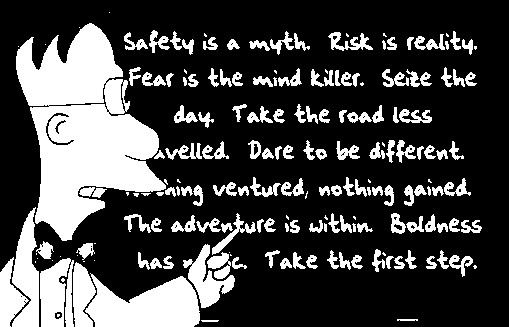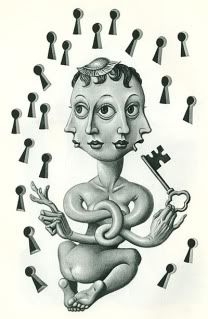(Cross posted from DailyKos)
The Dhammapada teaches
Conquer the angry man by love.
Conquer the ill-natured man by goodness.
Conquer the miser with generosity.
Conquer the liar with truth.
While most of us understand the logic of this approach in theory, it far too rarely spills over into practice.
The world is becoming an increasingly scary place. Torture and extraordinary rendition are being committed by the United States government, and through other governments’ forces as proxies. Mercenary armies such as the infamous Blackwater are on the rise and already operating within the United States, marking potentially the most horrifying trend in the commercialization of violence. Blackwater is even slated to begin involvement with the enforcement of prohibition, making the “War on Drugs” moniker seem increasingly ominous. Prohibition itself is a travesty of epic proportion that has lead to the incarceration of staggering numbers of non-violent citizens, caused suffering throughout the world, and halted virtually all progress in fascinating avenues of research that bear the promise of more effective medical treatments as well as breakthroughs in understanding of the brain. The U.S. Military now has a presence in nearly every country in the world, and there are countless cases of injustices committed by soldiers against innocent members of the local populations. Our healthcare system is in shambles leaving the demographic most in need of the wealth we possess struggling to afford a standard of care that should be guaranteed to all U.S. citizens. Don Siegelman, and so many others, have been wrongfully persecuted on an ideological basis while the crooks doing the persecution have thus far avoided being brought to justice. Despite refusing to serve a subpoena pertaining to the Siegelman case, Karl Rove remains a free man. George Bush has issued more signing statements than all prior presidents combined in mockery of American ideals of justice and balance of power. Pondering these things can be pretty overwhelming to say the least.
Its easy to get angry when contemplating the state of the world we live in. One could argue that anger plays an important, even necessary, role in the cycle of change. While I do believe that stoking the flames of our moral outrage plays a indispensable role in that it is a powerful impetus for beginning to work in earnest for change, we must all remember that anger is an emotion of limited utility valuable only when properly channeled and devastating when not. Anger can be one of the greatest enemies of reason. Actions born from even the most righteous sense of moral outrage so often have calamitous results. It is my argument that rather than acting out of anger, it is our duty as people of conscience to constantly strive to act compassionately. If we truly wish to change the world for the better, we must transmute our anger into compassion.
First let us consider that as bad as the state of the world appears, it has been worse. Overall violence is experiencing a sharp decline on a global scale. As much as we as a species are doing wrong, we’re clearly doing something right. During the early periods of human history when anarchism and tribalism were the primary forms of social organization, there were powerful evolutionary and cultural imperatives to establish restrictive categories of who is and is not deserving of compassionate and altruistic action. Establishing an “us vs them” mentality proved to be a highly effective survival strategy in the perilous and unforgiving natural world. However with the maturation of the goals of human society, what was once a vital tool for survival has become a blight on the flower of our civilization. Nevertheless evolution has equipped us with tools necessary to progress beyond our current limitations and bring into realization the ultimate goal of a society based on reason and compassion. Contemporaneous to the development of our tendency to divide the world into “us vs them” was the development of our immense potential for compassion to those we consider to be within our group. Thus I feel the solution is ultimately fairly simple: we must all work towards recognition of the inherent unity of the human family. This is of course far more simple in theory than in practice, but as reflected by trends in the decline of violence, this process of boundary dissolution has already begun.
Now the question becomes, how do we consciously expand our circle of compassion, and perhaps, more importantly, how do we encourage others to do so as well? Fortunately encouraging others to expand their circle of compassion may be as simple as nurturing our own compassion. In Tibet the Buddha’s teachings are traditionally called the lions roar, for just as the lions roar awakens the other animals of the jungle, spreading and, more importantly, practicing teachings of compassion and mindfulness gradually awaken the closed hearts of beings throughout the world. The most fundamental step in cultivating compassion is to simply learn to smile more. Religious traditions from the Christians, to the Buddhists, to the Taoists, to the Hindus have long known that simply smiling more throughout the day leads to a more joyous experience of living and more pleasant interactions with other people. In fact medical science has recently caught up and discovered that even the physical act of smiling improves mood. We can take this basic knowledge and extrapolate it further to expand our practice of compassion. Be more polite to people you encounter throughout the day, don’t take the services of other people for granted because they are profiting from providing them, be more willing to offer your time and energy to others, and so forth. Once the habit of practicing these small deeds of recognition of the inherent value of other people has been ingrained in your daily life, I am confident you will be amazed by the sense of mental peace and clarity that develops as a result. The hardest and most important habit to cultivate is embracing those with ideas that you find offensive. We must recognize that humans have an extraordinary capacity for unconditional love, even if it is deeply buried under a haze of ignorance and conditioning. It is far more productive to forgive people for their ignorance and try to transfer your understanding to them in a non-hostile way than to take offense and respond in anger, further expanding the rift of misunderstanding. As a final suggestion for the practice of cultivating compassion, even a few minutes a day of loving-kindness meditation in a quiet place with minimal distraction can provide immeasurable benefits.
In closing, fighting fire with fire is a futile gesture. If we wish to ensure that the culture of violence that has plagued humanity since time immemorial does not regain its foothold, we must practice small acts of compassion in our daily life, spread our wisdom through conversation and blogging, and participate in peaceful activism. As compassionate ideals begin to take root, the fear that has so long been exploited by those with greed for power will begin to wither and die, and we can finally achieve the desired fruit of our fore fathers and leave a peaceful world full of opportunity for posterity.





